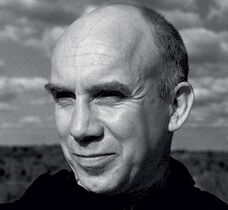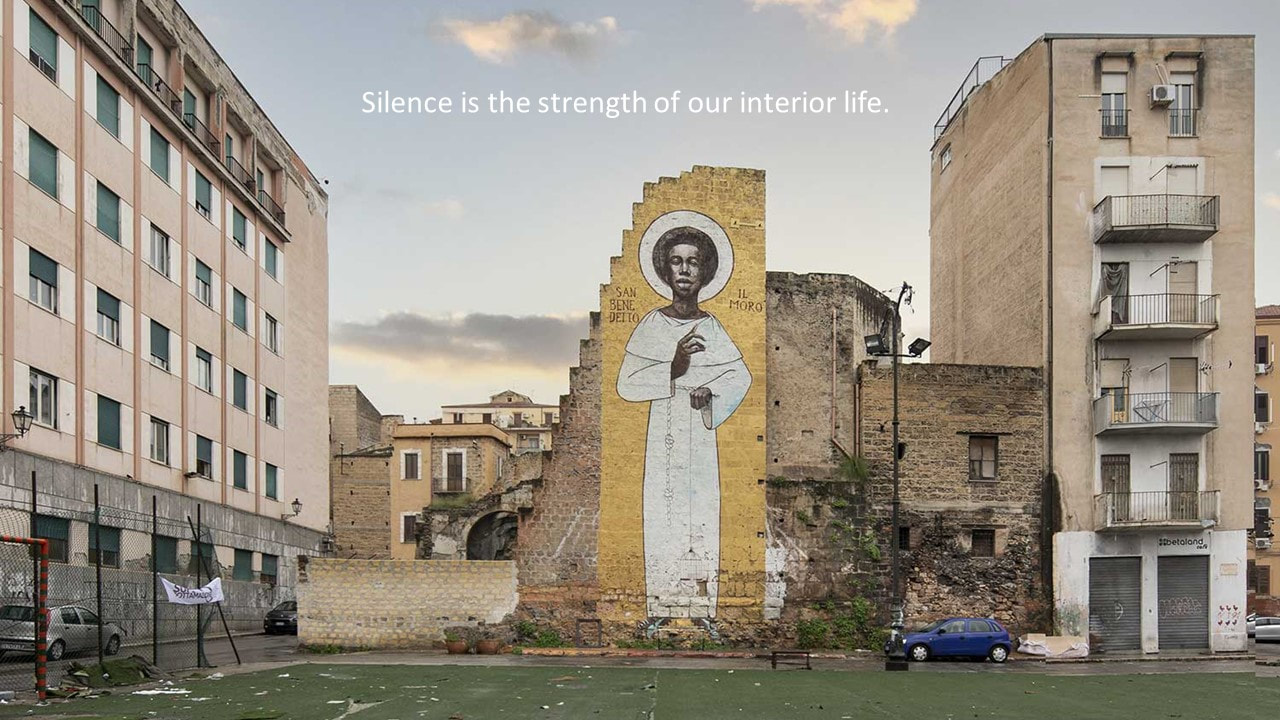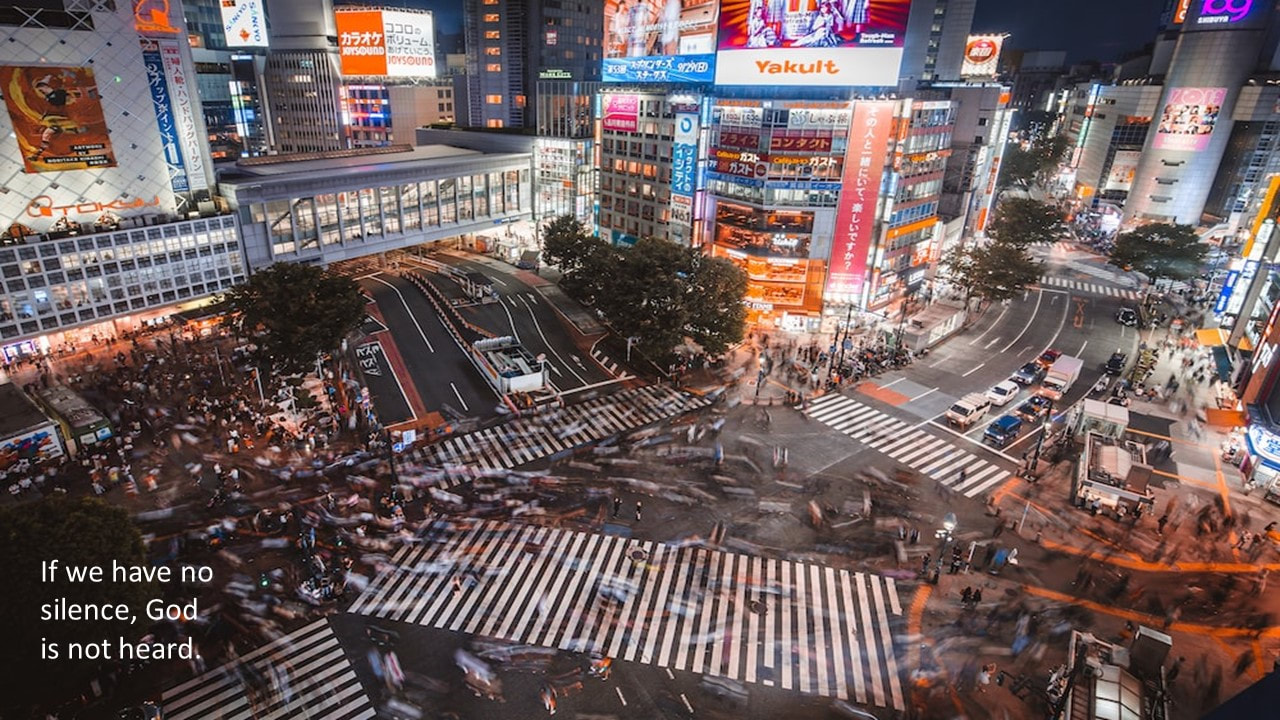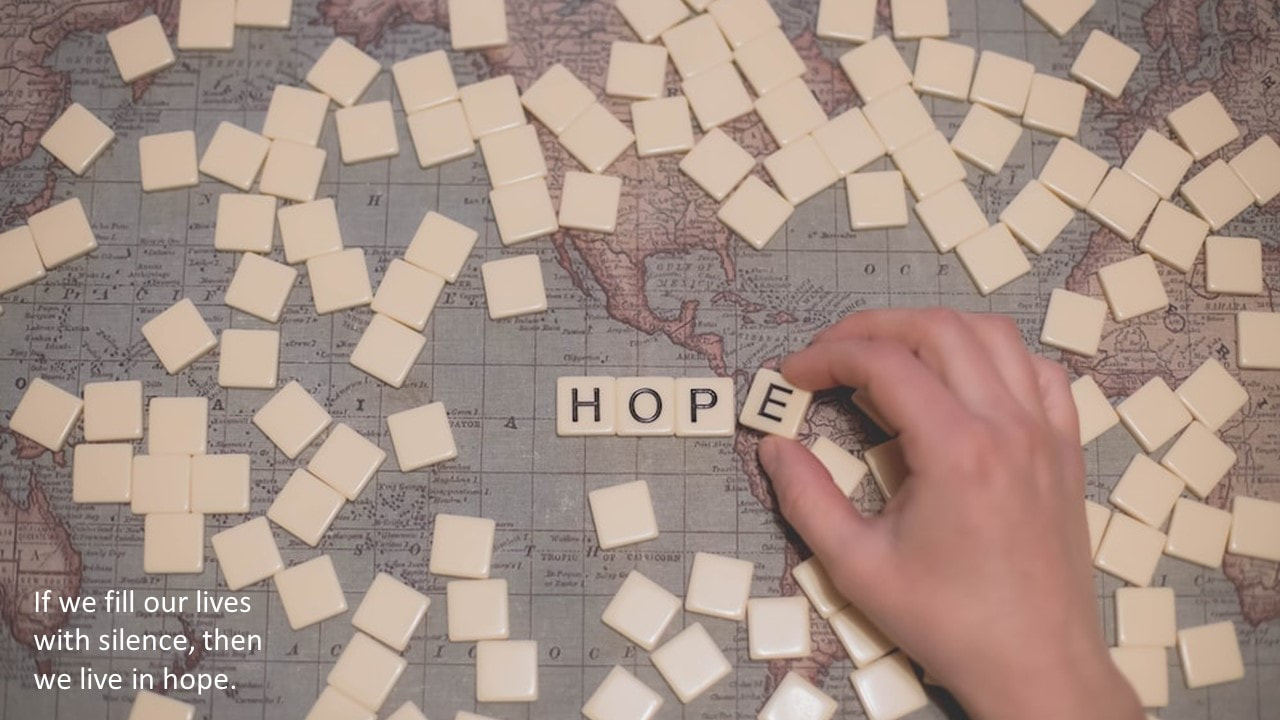The first week of each month has a short, image-backed quote with links to associated resources in the text below it. In other weeks, the short quote is taken from a longer one by the month's author, found below the image. The last week of the month has a short quote and questions to encourage reflection on all the month's quotations and images.
Thomas Merton, our author for December, was probably the most well-known Western monk of the twentieth century, doing much to draw many Christians - and those who would not identify in this way - towards a more contemplative way of life.
Read more about Thomas Merton's book, No Man Is An Island, from which this month's quotes are taken, by clicking here.
Read more about Thomas Merton's book, No Man Is An Island, from which this month's quotes are taken, by clicking here.
|
Guided Meditation for all quotes:
For a 5 minute audio guided meditation to use with each week's quote, click the play button on the image. To pause, and restart, click in the same place. To see the image full screen as you listen, click the expand screen icon in the corner. |
Lectio Divina for longer quotes:
For an audio guided Lectio Divina to use with this week's longer quote, click the play button on the image. Allow 10-15 minutes for this practice. For a text version of the Lectio, click the button. |
Monday 4th December, 2023
Thomas Merton, No Man Is An Island (Shambhala, 1955), 274.
Image: igorscalisipalminteri.it/works/streetart-artist-saint-benedict-the-moor-albergheria-neighbourhood-palermo-2018/
This short image-backed quote is from Thomas Merton's No Man Is An Island (Shambhala, 1955), 274.
To read more about this book, click here.
Thomas Merton, OSCO - the Order of Cistercians of the Strict Observance - was an American Trappist monk whose mid-twentieth century writings about monastic life and much beyond were at least as widely hailed in the secular world of books as within the Church. Born in France in 1915, Merton's mother was a Quaker and his father was a painter, active in Europe and the USA and absent for much of Merton's childhood. Having moved to New York in 1918, in 1921, only three years after the birth of his younger brother, their mother died of cancer. Merton studied modern languages as an undergraduate at Clare College, Cambridge, before returning to further studies at Columbia University, NY, where, impressed by the groundedness in God of a Hindu monk, Mahanambrata Brahmachari, who unexpectedly advised Thomas to explore the roots of his own tradition, Merton was baptised into the Roman Catholic church in 1938.
Merton entered the Abbey of Our Lady of Gethsemani in 1941 (see here), which remained his home until an untimely death during a trip to Thailand in 1968. In the intervening years Merton wrote prolifically, in journals that, published, run to seven volumes (see here); in five volumes of letter-writing with numerous well-known people of the period (see descriptions here); and an output of more than 50 books in 27 years! You can read about his autobiography,The Seven Storey Mountain (Harcourt Brace, 1948), his first critically acclaimed book, here.
In 1965 Merton was given permission by his monastic superiors for the long-sought solitude of a hermitage close to Gethsemani Abbey. For those who enjoy films, try The Day of a Stranger (2021) - see here - a beautifully contemplative short film about Merton and his hermitage by Cassidy Hall (who also co-produced In Pursuit of Silence (2015) - see her talking about this here). If gentle music is a good way for you to engage with faith, then Alana Levandoski's Pointe Vierge: Thomas Merton's Journey in Song, sets some of Merton's words to music, alongside narration and quotes from James Finley, our author in October and a novice monk under Merton, is well worth a listen: see here for a video of her talking about this and one of the tracks for free, here. Finley's book, Merton's Palace of Nowhere ( Ave Maria Press, 1978) - see here - has been a classic way of engaging with Merton's thought for more than 25 years. For a free, one-hour audio with many photos and drawings by Merton, Merton in His Own Voice (2013), see here.
If you''d like to explore Merton's life and output in more depth, a great source of information is the UK's Thomas Merton Society - see here - or the International Merton Society - see here - where you can find a chronology of Merton's life and works, here.
Merton entered the Abbey of Our Lady of Gethsemani in 1941 (see here), which remained his home until an untimely death during a trip to Thailand in 1968. In the intervening years Merton wrote prolifically, in journals that, published, run to seven volumes (see here); in five volumes of letter-writing with numerous well-known people of the period (see descriptions here); and an output of more than 50 books in 27 years! You can read about his autobiography,The Seven Storey Mountain (Harcourt Brace, 1948), his first critically acclaimed book, here.
In 1965 Merton was given permission by his monastic superiors for the long-sought solitude of a hermitage close to Gethsemani Abbey. For those who enjoy films, try The Day of a Stranger (2021) - see here - a beautifully contemplative short film about Merton and his hermitage by Cassidy Hall (who also co-produced In Pursuit of Silence (2015) - see her talking about this here). If gentle music is a good way for you to engage with faith, then Alana Levandoski's Pointe Vierge: Thomas Merton's Journey in Song, sets some of Merton's words to music, alongside narration and quotes from James Finley, our author in October and a novice monk under Merton, is well worth a listen: see here for a video of her talking about this and one of the tracks for free, here. Finley's book, Merton's Palace of Nowhere ( Ave Maria Press, 1978) - see here - has been a classic way of engaging with Merton's thought for more than 25 years. For a free, one-hour audio with many photos and drawings by Merton, Merton in His Own Voice (2013), see here.
If you''d like to explore Merton's life and output in more depth, a great source of information is the UK's Thomas Merton Society - see here - or the International Merton Society - see here - where you can find a chronology of Merton's life and works, here.
Monday 11th December, 2023
Thomas Merton, No Man Is An Island (Shabmhala, 1955), 134.
Image: Denys Nevozhai, San Francisco, USA, unsplash.com/@dnevozhai
The short, image-backed quote, above, is taken from this week's longer quote, below, in Thomas Merton's No Man Is An Island (Shambhala, 1955), 133-134. For more about this book, click here.
|
Listen to this week's longer quote:
To listen to the longer quote, below, being read, click the play button on the small version of the image next to or below this text. To see the image full screen as you listen, click the expand screen icon in the corner. |
|
Please remember that, although references to God and all people using male pronouns may sit less comfortably with many of us today, Merton was writing in the 1950s and 60s when this was the norm. The last lines of this week's long quote are also challenging and might jar with contemporary readers but their core message is still worth our reflection.
'One who is content with what he has, and who accepts the fact that he inevitably misses very much in life, is far better off than one who has much more but who worries about all that he may be missing. For we cannot make the best of what we are, if our hearts are always divided between what we are and what we are not.
The lower our estimate of ourselves and the lower our expectations, the greater chance we have of using what we have. If we do not know how poor we are we will never be able to appreciate what we actually have. But, above all, we must learn our own weakness in order to awaken to a new order of action and of being — and experience God himself accomplishing in us the things we find impossible.
We cannot be happy if we expect to live all the time at the highest peak of intensity. Happiness is not a matter of intensity but of balance and order and rhythm and harmony. Music is pleasing not only because of the sound but because of the silence that is in it: without the alternation of sound and silence there would be no rhythm. If we strive to be happy by filling all the silences of life with sound, productive by turning all life’s leisure into work, and real by turning all our being into doing, we will only succeed in producing a hell on earth.
If we have no silence, God is not heard in our music. If we have no rest, God does not bless our work. If we twist our lives out of shape in order to fill every corner of them with action and experience, God will silently withdraw from our hearts and leave us empty.'
Monday 18th December, 2023
Thomas Merton, No Man Is An Island (Shabmhala, 1955), 275.
Image: Dayne Topkin, unsplash.com/@dtopkin1
The short, image-backed quote is taken from this week's longer quote, below, in Thomas Merton's No Man Is An Island (Shambhala, 1955), 275. For more about this book, click here.
|
Listen to this week's longer quote:
To listen to the longer quote, below, being read, click the play button on the small version of the image next to or below this text. To see the image full screen as you listen, click the expand screen icon in the corner. |
|
'If we fill our lives with silence, then we live in hope, and Christ lives in us and gives our virtues much substance. Then, when the time comes, we confess him openly … and our confession has much meaning because it is rooted in deep silence. It awakens the silence of Christ in the hearts of those who hear us, so that they themselves fall silent and begin to wonder and listen. For they have begun to discover their true selves.
If our life is poured out in useless words we will never hear anything in the depths of our hearts, where Christ lives and speaks in silence. We will never be anything, and in the end, when the time comes for us to declare who and what we are, we shall be found speechless at the moment of the crucial decision: for we shall have said everything and exhausted ourselves in speech before we had anything to say.'
Monday 25th December
Thomas Merton, No Man Is An Island (Shabmhala, 1955), 274.
Image: Kelly Sikkema, Iowa, USA, unsplash.com/@kellysikkema
The last week of each month offers some questions to help you reflect further on its quotations and images, and how they resonate with your own spiritual journey and relationship with God.
You can engage with these using the written text or the audio version of the questions, below.
|
Listen to the reflection questions:
To listen to the reflection questions, below, being read, click the play button on the REFLECT image next to or below this text. To see the image full screen as you listen, click the expand screen icon in the corner. |
|
Reflection questions:
Before reflecting on this month's quotes and images, take time to re-ground yourself in your body.
Perhaps take a few slow breaths, feel your feet on the floor and be aware of how your body feels in this moment.
1) Read back over or listen again to this month's quotes and spend time looking at their associated images. As you do so, note a phrase or image that draws your attention. If this is a phrase, you might like to write this out in a journal or on a piece of paper where you will see it regularly. Consider reading aloud several times what you have written to help the words sink more deeply into your heart. If an image resonates with you, let your gaze rest lightly on it for a couple of minutes, allowing it to speak to your heart. Consider using it as a screensaver for a while, or perhaps print it out and place it somewhere that you will see it often.
2) What emerges as you sit with the phrase or image that attracted your attention? Does a new insight or a question, emotion or sensation arise? Take some time to write down and ponder on whatever you notice.
3) Where can you see hope in the midst of what is emerging in you, for yourself, your neighbour, your community, or the planet? How might this impact your daily life and those with whom you share it?
4) In the days and weeks to come, how can you stay open to what you have discovered from your reflections?
Take some time to give thanks for the hope that you have found in this month's quotes and images.
Before reflecting on this month's quotes and images, take time to re-ground yourself in your body.
Perhaps take a few slow breaths, feel your feet on the floor and be aware of how your body feels in this moment.
1) Read back over or listen again to this month's quotes and spend time looking at their associated images. As you do so, note a phrase or image that draws your attention. If this is a phrase, you might like to write this out in a journal or on a piece of paper where you will see it regularly. Consider reading aloud several times what you have written to help the words sink more deeply into your heart. If an image resonates with you, let your gaze rest lightly on it for a couple of minutes, allowing it to speak to your heart. Consider using it as a screensaver for a while, or perhaps print it out and place it somewhere that you will see it often.
2) What emerges as you sit with the phrase or image that attracted your attention? Does a new insight or a question, emotion or sensation arise? Take some time to write down and ponder on whatever you notice.
3) Where can you see hope in the midst of what is emerging in you, for yourself, your neighbour, your community, or the planet? How might this impact your daily life and those with whom you share it?
4) In the days and weeks to come, how can you stay open to what you have discovered from your reflections?
Take some time to give thanks for the hope that you have found in this month's quotes and images.
|
To return to the 'Quoting Silence: A month with ...' Collection, click the button.
|





